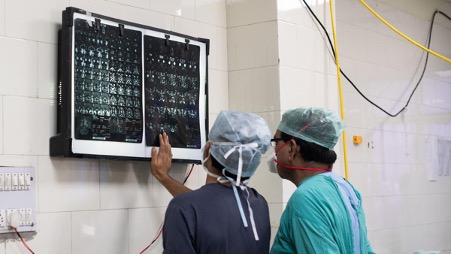Dimerix’s lead drug candidate DMX-200 has been given regulatory green light for approval for a Phase 3 study in COVID-19 ravaged India.
Clinical-stage biotech Dimerix (ASX:DXB) has received approval from the review committee in India for a Phase 3 clinical study into the treatment of COVID-19 patients with its lead drug candidate DMX-200.
The Central Drugs Standard Control Organization (DCGI) reviewed the CLARITY 2.0 study protocol and recommended its approval.
Multiple clinical sites in India have been initiated and are ready to start recruitment in the study of CCR2-inhibitor DMX-200 for the treatment of respiratory complications associated with COVID-19 imminently.
The CLARITY 2.0 study aims to develop a treatment that can help ease early-stage respiratory symptoms and prevent a patient needing intensive hospital care. The first patient is expected to be dosed in the next few weeks.
In a country such as India, with a population of more than 1.3 billion that’s been heavily impacted by COVID-19 and a third wave expected to peak around October, the importance of additional early-stage treatments has become prevalent.
DMX-200 treatment may expand to other respiratory complications
The study is led by The University of Sydney NHMRC Clinical Trials Centre Director Professor Meg Jardine in collaboration with Professor Vivek Jha and The George Institute for Global Health India.
“It is possible the virus, particularly the new variants, will be circulating globally for the foreseeable future,” Jardine said.
“Vaccines have now been developed that aim to prevent infection or reduce disease severity. However, even with the widespread uptake of vaccines, there will be some who remain susceptible to COVID-19. Improving treatments for patients hospitalised with COVID-19 remains crucial.”
CEO, Nina Webster, commented that “Sadly, the world continues to feel the effects of COVID-19, including here in Australia and we are extremely pleased to be in a position to potentially treat COVID-19 patients suffering debilitating respiratory complications,” .
Webster said if DMX-200 is found to be an effective treatment for COVID-19, which is likely to be around for some time to come, it may also be of benefit in respiratory complications associated with other infections, such as pneumonia and influenza.
“This provides an opportunity that could extend well beyond the impact of COVID-19 and we look forward to recruiting participants and to reporting on dosing progress in the coming months.”
Phase 3 study for DMX-200 COVID-19 treatment in Europe continues
As the COVID-19 pandemic continues to impact health systems and economies worldwide, with the emergence of new variants such as Delta, the search for effective treatments remains a top priority of governments and health bodies globally.
Dimerix’s DMX-200 is part of two different Phase 3 studies in COVID-19 patients with respiratory complications, including the Phase 3 ACE2 RAS modulation REMAP-CAP study in Europe.
The study across multiple global sites is evaluating the effectiveness of DMX-200 when administered together with an angiotensin receptor blocker in COVID-19 positive cases. It is expected to reach its recruitment capacity of 600 patients across all treatment arms towards the end of 2021, with preliminary data available soon after.
Dimerix advances clinical trials into FSGS treatment
While DMX-200 has become global player in the fight against COVID-19, the drug is also providing treatment hope for patients with the serious kidney disease FSGS (focal segmental glomerulosclerosis).
Dimerix Phase 3 trials are underway into treating FSGS patients with DMX-200, titled Angiotensin II Type 1 Receptor (AT1R) & Chemokine Receptor 2 (CCR2) Targets for Inflammatory Nephrosis or ACTION3 for short.
Dimerix has also found extensive support from regulators in the US, UK, and Europe as it advances the clinical trials, with currently no approvals for the treatment of FSGS with a strong unmet medical need.
FSGS attacks the kidney’s filtering units where blood is cleaned causing irreversible scarring, which leads to permanent kidney damage and failure requiring dialysis or transplantation. For sufferers who receive a kidney transplant, approximately 40% will get recurrent FSGS in the transplanted kidney.
FSGS is a billion-dollar plus market, affecting around 210,000 people globally each year with a forecasted compound annual growth rate of 8%.
The Dimerix share price was up 7.86% to 30 cents on Friday.
This article was developed in collaboration with Dimerix, a Stockhead advertiser at the time of publishing.
This article does not constitute financial product advice. You should consider obtaining independent advice before making any financial decisions.
You might be interested in












